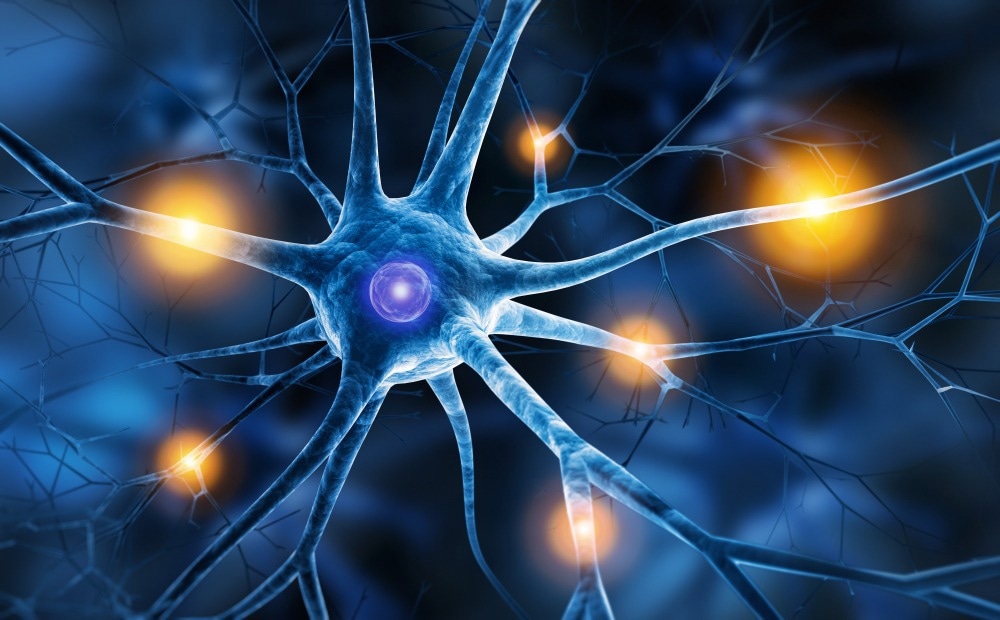The emerging field of proteomics has already helped further the field of medical science by identifying potential drug targets for numerous diseases, deepening our understanding of healthy, functional biological processes and how these processes are different in disease. Here, we focus on how proteomics is being used to expand our understanding of neurobiology, as well as what has already been learned and what we might discover in the future.

Image Credit: peterschreiber.media/Shutterstock.com
From genomics to proteomics
Proteomics is an emerging field of science investigating the proteome, the set of proteins produced by an organism (such as a human), a biological system, or a biological process on a large scale. The field of proteomics has evolved out of the successes in genetics we have witnessed in recent decades, with the publication of the entire human genome as a result of the Human Genome Project being a major driver of this work. Genes code for proteins, and since sequencing and mapping the genomes of humans and other animals has occurred, we have a greater opportunity to investigate the proteome.
While genes often get much more attention and are more commonly understood by the general public, proteins are the biological ‘work horses’. Genes act as a blueprint, instructing the body on which proteins to produce and when. Every human cell has roughly 12,000 genes active at one time, producing over 42,000 different proteins. Understanding how these proteins relate to biological processes is key to answering today’s most important questions in biology, including how to treat and prevent various common and rare diseases.
What have we learned from proteomics?
Proteomics is still in its infancy and has yet to reach its full potential. However, many groundbreaking discoveries and innovations have already emerged from this growing field. For example, proteomics has successfully established a novel potential drug candidate for bladder cancer, developed a test for the early detection of Alzheimer’s disease, highlighted potential biological molecules that may be influential in creating novel malaria treatments, discovered numerous drug targets for various cancers, and has been useful in the fight against the COVID-19 pandemic in revealing the vertical transmission of SARS-CoV-2 from mother to fetus.
In recent years, proteomics has been increasingly leveraged to look more closely at the brain. Scientists have successfully identified proteins in the brain to help gain a deeper understanding of the nature of neurodegenerative diseases, how human aging works, how memories are formed, and how olfactory learning occurs, to name a few.

Image Credit: LightField Studios/Shutterstock.com
Protein interactions are vital for brain function
The human brain relies on networks of protein-protein interactions and signaling complexes to support normal function. Irregular functioning of proteins in the brain is often the cornerstone of neurological disorders. However, while we have learned a vast amount about the biology and physiology of the brain, details on how these protein interaction networks are dysregulated in neurological disorders have largely remained elusive. Now, step by step, scientists are developing a clearer picture of how proteins are implicated in the functioning of the brain with the help of proteomics.
Proteomics works by focusing on identifying, localizing, and establishing the functionality of the proteome of a cell. Various factors, such as age, stage of the cell cycle, and external or internal signaling events, alter the proteome. Disease, it has been discovered, also changes the proteome.
For example, our understanding of Alzheimer’s disease is being furthered by proteomics. As it stands, the molecular basis of the pathogenesis of this disease is incomplete; however, mass-spectrometry-based proteomic studies have quantitatively examined thousands of proteins implicated in this disease. The results of these studies will help to drive future studies that will aim to identify new biomarkers of disease and novel drug targets.
Human memory is another area that has received attention from proteomics. Studies have confirmed the involvement of numerous proteins, including protein kinase C (PKC), adenylate cyclase (AC), as well as proteins in the mitogen-activated protein kinase (MAPK) pathway in long-term memory processes. Given that long-term memory is often compromised in many neurological diseases, this development in our understanding of the proteins involved in this vital process will help drive new disease models and identify novel biomarkers and therapeutic targets.
Overall, proteomics studies in neurobiology allow us to gain an unprecedented view of the workings of the human brain. This will lead to the development of novel therapies for neurological disease, particularly neurodegenerative disease, as well as enhanced diagnostic tools and preventative methods. In the future, we hope to see improvements in outcomes for patients with neurological diseases, as well as a reduction in disease prevalence, if proteomics in neurobiology reaches its full potential.
Sources:
- Caudle, W., Pan, S., Shi, M., Quinn, T., Hoekstra, J., Beyer, R., Montine, T. and Zhang, J., 2008. Proteomic identification of proteins in the human brain: Towards a more comprehensive understanding of neurodegenerative disease. PROTEOMICS - CLINICAL APPLICATIONS, 2(10-11), pp.1484-1497. https://www.ncbi.nlm.nih.gov/pmc/articles/PMC3142616/
- Cookson, M., 2019. Proteomics: techniques and applications in neuroscience. Journal of Neurochemistry, 151(4), pp.394-396. https://www.ncbi.nlm.nih.gov/pmc/articles/PMC6856389/
- Rosenegger, D., Wright, C. and Lukowiak, K., 2010. A quantitative proteomic analysis of long-term memory. Molecular Brain, 3(1). https://www.ncbi.nlm.nih.gov/pmc/articles/PMC2860487/
- Ubaida-Mohien, C., Moaddel, R., Moore, A., Kuo, P., Faghri, F., Tharakan, R., Tanaka, T., Nalls, M. and Ferrucci, L., 2021. Proteomics and Epidemiological Models of Human Aging. Frontiers in Physiology, 12. https://www.frontiersin.org/articles/10.3389/fphys.2021.674013/full
- Wingo, A., Dammer, E., Breen, M., Logsdon, B., Duong, D., Troncosco, J., Thambisetty, M., Beach, T., Serrano, G., Reiman, E., Caselli, R., Lah, J., Seyfried, N., Levey, A. and Wingo, T., 2019. Large-scale proteomic analysis of human brain identifies proteins associated with cognitive trajectory in advanced age. Nature Communications, 10(1). https://www.nature.com/articles/s41467-019-09613-z
Further Reading
Last Updated: Oct 24, 2022